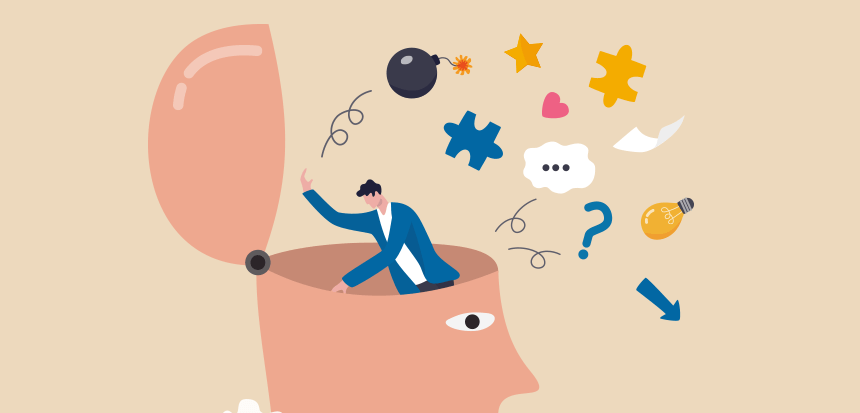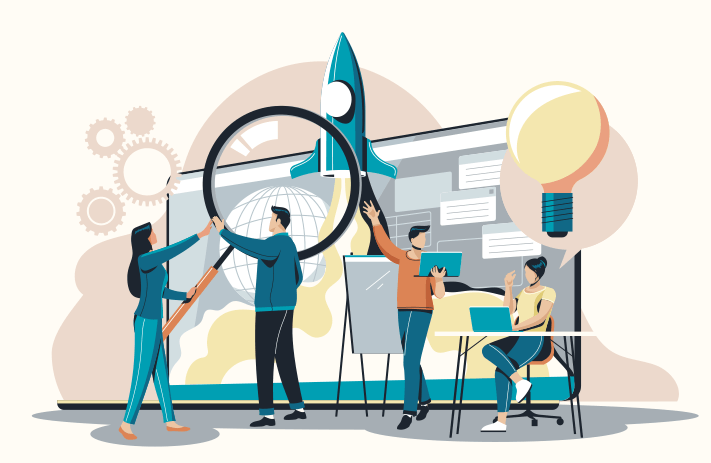
Click the button to start reading
How To Stop Thinking About Work
You know how it goes…
Friday: Get home exhausted, brain still whirling with to-dos both pending and new ones to add to your list.
Saturday: Sleep in but only for a bit, you dreamt about work and don’t feel the least bit rested. You get up anyway because you have a million chores and errands that you neglected during the week because you stayed late each day.
Sunday: You feel a sense of relaxation in the morning but, as the day progresses, the Sunday night scaries creep in reminding you of all of the work that needs to be done on Monday. You didn’t dream about work last night but you know you will tonight.
Wash, rinse, repeat.
Your body may check out after your work day but your brain is still very much clocked in… and it isn’t registering overtime hours that will show up on your paycheck.
In the days before the internet, it was significantly easier to leave your work where it belonged. Unfortunately, as much as digital work has awarded us with incredible flexibility, it has also set an unhealthy expectation to be “on” outside our usual (and paid) working hours. Nearly half of people are guilty of checking work related emails outside of their regular working hours. When something is so common and the daily grind so glorified, it’s hard to truly disconnect from work without some serious guilt.
Red flags are everywhere and workers are waking up to the fact that they need to learn how to disconnect from work for our own wellbeing as a worker but also as a human.

Harmful Effects of Not Checking Out From Work
Checking into work during personal time is not only an annoying habit, it has been glamorized,
Busy is sexy… apparently.
But there is nothing sexy about the very real consequences of taking work home with you.
Mental Health Decline
Only recently have there been quantitative strides in reducing the stigma around mental health. While it’s late, it nonetheless is welcome and more people are acknowledging the fact that mental health is health. You can only think of one thing at a time and every minute that you are thinking about work, you are not thinking about:
- Making a date to have coffee with a friend
- New recipes
- Helping a child with homework
- Moving your body
- Starting a hobby
- Developing new skills
- Literally anything else
Much like refusing to keep weight off a sprained ankle will only hinder your healing, refusing to give your brain a break will cause mental health issues.
Also important to our mental health is the ability to set boundaries. We may feel like working at all hours and being on call sends the message that we’re dedicated and committed workers and that actually was the case back in the day. Staying late, going the extra mile… these activities would essentially guarantee a move up the corporate ladder. Today, there is more education around this topic and more employers are aware that this kind of activity actually has a negative effect on productivity. Overworking doesn’t make you more productive, what it does do is make it painfully obvious that you have a boundary setting issue and struggle with effective time management. Overworking is your ticket to burnout.
Burnout is not a buzzword, it’s a real condition and even the World Health Organization (WHO) has updated their definition to better reflect reality:
“a syndrome conceptualized as resulting from chronic workplace stress that has not been successfully managed”.
Symptoms of burnout include depression, exhaustion, negative feelings towards your job, and reduced productivity. There has been a push lately to reduce the stigma around burnout and also better understand the severity and the impacts it can have on your life. Given that more than half (52%) of working people express feeling burnt out by their work, it’s past time that it be taken seriously.

Physical
Not being able to shut off after work leads to stress.
When you check up on work outside of work hours, it causes anticipatory stress, a type of stress that you feel when you are anticipating something. Mental stress manifests into physical symptoms as it progresses. The physical symptoms of stress are numerous and include trouble sleeping, high blood pressure, aches and pains, digestive issues, and heart problems just to name a few.
While these symptoms are directly correlated to stress, there are a number of secondary issues that come with how someone chooses to deal with that stress. Many people turn to substances like alcohol to cope or develop other unhealthy habits around food and drink consumption that further exacerbate the physical symptoms of stress related to overworking.
The bottom line is that stress is not just in our head, it lives in our body. Your body needs time to recover from work and, like an overtired toddler, it protests when it doesn’t get what it wants.

Relationships
The time people spend plugged in outside of work unsurprisingly affects your personal life, specifically your relationships with the people around you. You are unintentionally sending a message that people are second on your priority list after your job. It’s easy to say simply put down the phone and pay attention to what is in front of you but there is a mindset block that needs to be tackled to let you do that.
I am sure you have been on the receiving end of someone who cannot let go of work, you see the back of their phone more than you see their face. How does that feel? Not great.
Practice being present when you are around people. If someone is willing to share their valuable time and attention with you, the least you can do is provide yours in return.

So, How Can You Detach From Work?
It’s easier said than done but there are some ways that can help you set appropriate boundaries between work and personal life, even if you are a remote worker.
Have a Plan
It’s one thing to say that you will start to actually disconnect from work, it’s another to have a concrete plan.
Be clear on your actual work commitments. If you are paid to work from 8:30am – 4:30pm, set an alarm for 4:15pm or 15 minutes before you are due to finish for the day. That alarm will signal that it’s time to pull out your to-do list and empty your brain of items that will need your attention tomorrow… at 8:30am.
By taking the time to write down the tasks that you need to accomplish, you have gotten them out of your head and given your brain permission to stop thinking about them. Part of the reason that we tend to ruminate over future tasks is because we have not properly removed them from our head and put them somewhere safe where your brain is confident that it won’t be forgotten. Time management guru Dave Crenshaw calls this mind clearing and it’s highly effective when it comes to giving yourself permission to move on because you know that you won’t forget it.
Try keeping note pads in places where you find yourself thinking of work or use the voice to text function on your phone to record things as they come up and get them out of your head as quickly as possible. You may not be able to stop thinking about work completely but you can start limiting that time and get comfortable with it.
Change Your Environment
If you are like a good chunk of the workforce in 2021, you likely work remote or have a home office. While home offices are incredibly convenient and the vast majority of remote workers report a better work and life balance, it’s even more difficult to shut off for the day when you’re a mere ten steps away from where you work.
If possible, have a dedicated office space with a door. Working from a small desk in your bedroom is less than ideal and is guaranteed to interfere with any healthy night routine. Work related technology such as your computer, laptop, tablet, or phone should stay in this space and only accessed during work hours.
Minus your dedicated office space, make your home a work free haven. Having a cue – whether it’s closing your office door or turning off the light – that signals you are done for the day will help set this boundary. It’s also helpful to have a reward waiting for you. A reward can be as small as a cup of tea or permission to listen to your favourite podcast while you prep supper.
If you work outside of the home, your cue can be the second you leave the building or when you get into your car. Turn on an after work playlist as you make your way home and arrive in the right frame of mind to relax.

Manage Notifications and Screen Time
Today, parents don’t hesitate to set screen time limits when it comes to their kids as they are acutely aware of the negative effects of being glued to a screen on developing minds. But, if you are working age, chances are that your parents did not grow up with this technology and were not themselves taught how to responsibly manage their devices.
This trial by fire has left the majority of people with an unhealthy expectation of what is a reasonable amount of time to spend on our devices for both work and personal activities. While there is no standard set of time that is appropriate to be glued to our devices, disabling notifications is a great way to start. Go into your phone settings and find the do not disturb option, make friends with it. By disabling notifications outside of work hours, you will reduce the temptation to do work related activities.
Stop Venting
This might seem like contradictory advice. Venting can be a great way to let out some frustration while someone lends you an ear. But, here is the thing…
Venting about work is still thinking about work.
While it’s impossible to never need a good vent, consider the cost. Is your time better spent venting or would your mind and body be better served by a nice walk in the woods or a short drive for ice cream.
Embrace a Hobby
Maybe you have an old hobby that you‘ve neglected for years or have interest in something new. Dust off that old guitar, impulse buy some paint and canvas, or sign up for a kickboxing class. Having something to look forward to will help you fight the twitch to enter work mode after hours.
Communicate Your Boundaries
People are not mind readers. It’s important to communicate your boundaries with the people around you, especially those who are most apt to disregard them. The most likely culprits who infringe on your space are coworkers or your manager. Ideally, your management would be the ones enforcing healthy work and life boundaries but that isn’t always the case.
In their defence, they probably have no idea that they’re doing it and have been sucked into the hustle as much as you have.
Start small, add an email signature with expectations on when you will reply or add an out of office message. Take note of how people respond, it’s likely that your actions will give other people permission to set and maintain their own boundaries.

Set Reasonable Expectations During Your Work Day
Have you ever thought that work is spilling over into your personal time because you’ve tried to cram an unreasonable amount of it into your workday?
If you work an average 8 hour workday, consider that you likely have between 4-5 hours of productive work time. This makes sense when you factor in breaks, the time cost of switching between tasks, and of course interruptions. Start with the assumption that you have 4 hours to work with and break those down into 1 hour focus blocks with a single task dedicated to each. Consider this example:
- Hour 1: Draft report for Client #1
- Hour 2: Work on Project “x”
- Hour 3: Board Meeting
- Hour 4: Draft report for Client #2
When you consider your usual work schedule, this may seem too light. Give it a try and what you will find is that when you can focus on one task for a set period of time without interruption, you will see an increase in focus which will directly affect the quality and quantity of your work. You will finish projects and have small gaps in the day for work that requires less focus like checking emails or preparing to do lists.
Do It For You
Disconnecting from work is hard but not impossible, and it’s well worth learning how to because you were made for more than to just work, pay bills, and die. Understand the negative effects of overworking on your wellbeing and implement some of the tips mentioned to finally disconnect from work and enjoy a healthy work and life balance.
















